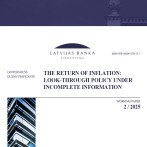Price trends in consumption groups formed unevenly in July
The total annual inflation remained low in July (0.6%) and its month-on-month changes were not substantial, but the process somewhat resembled the changes in average temperature on the globe. In other words, some consumption groups posted rather uneven price trends and July was rich both in events that had an immediate effect on inflation and events that could have a delayed effect, beginning with the African swine fever and ending with the deterioration in the trade relationship of the European Union (EU) countries with Russia.
A large part of inflation causing factors in July formed outside of Latvia, but no one factor predominated.
In July, the prices of oil and agricultural goods dropped in the global market, mostly affected by the stabilizing of the supply side (the political situation in oil producing countries; increased harvests) and less by the demand side. These factors lessened the pressure on Latvian foodstuffs and fuel prices, but they were not particularly visible in the July data (the prices of fuel and several food items, e.g., dairy products, with the exception of cheese, did not go down). Seasonal and domestic factors acted in a price-diminishing direction. Vegetable prices and, possibly because of the African swine fever, the prices of meat products, dropped. The prices of fresh meat did not go down, however, probably caused by prices evening out as a result of changed preferences, with consumers choosing meat other than pork.
Opposite to the global trend in oil product prices, the price of thermal energy went up in July, because it was determined by the price level in the global market in previous months because of which the price of natural gas (i.e. fuel) rose slightly. It must be noted, however, that in this case price does not mean expenditure: the consumption of thermal energy in households during the summer is small. As far as the prices of other goods and services related to household maintenance are concerned, however, the water and sewage tariffs raised in July by "Rīgas ūdens" will have a direct effect on household expenditures, when the consumption costs are calculated according to the new tariff, but inflation was affected already in July.
The impact of demand (to a substantial extent, because of consumption by non-residents) In July was primarily observed in service prices. As was expected, because of the great influx of tourists, in July, more than on average because of seasonal factors (yet less than last July in the case of hospitality services), the prices of hospitality- and catering-related services rose. Since the index of consumer prices is the measure of price changes and absolute prices cannot be judged by it, the impact of this seasonal demand can be suggested by examples from price monitoring. In July, which was the first month following the parallel display of prices, some prices of catering services, which were already "round" or "attractive" in euro, increased. Since the way of pricing did not change, it mostly suggests an impact of demand.
In the second half of July and beginning of August, the trade relations between Russia and the EU countries deteriorated, resulting in a growing risk of political factors impacting inflation. The sanctions set by Russia on the imports of many food and agricultural items from EU countries mean a greater concentration of production in the domestic market of the EU, which will act as a price dampening factor. In the case of Latvia, it may primarily affect the supply of fresh fruit and vegetables as well as dairy products. That will act to lower the pressure on inflation.
Textual error
«… …»






